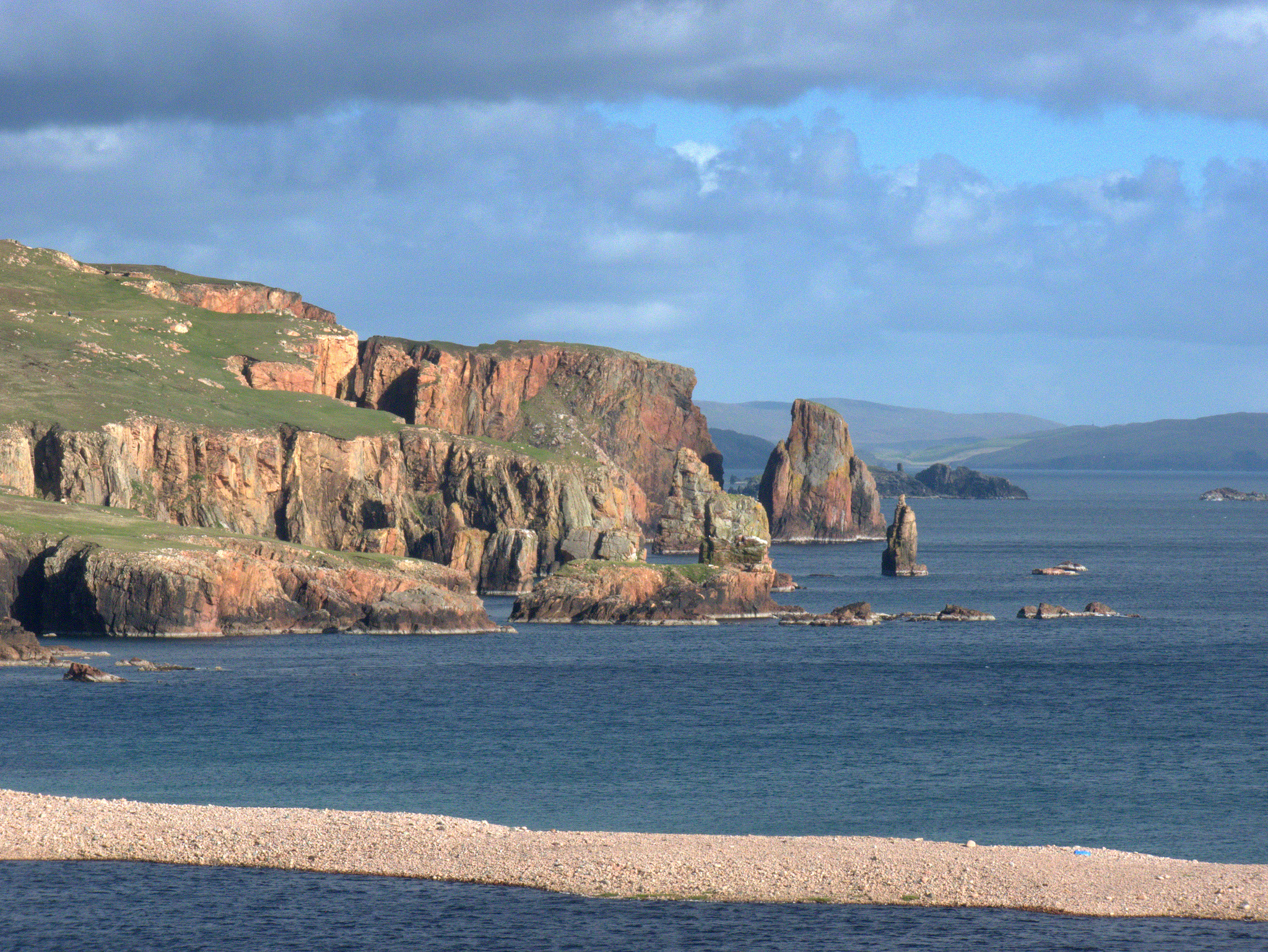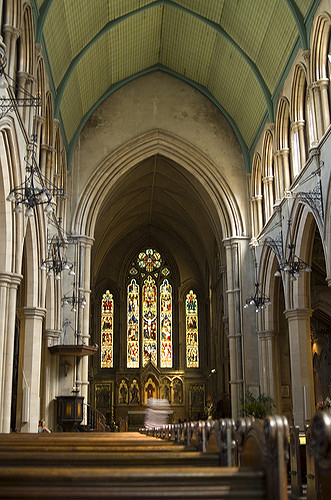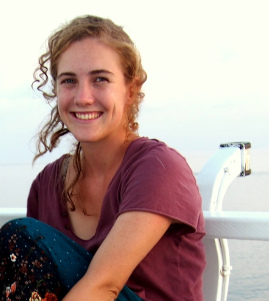
What types of experiences take someone from “wanting nothing to do with organised religion”, to leading the Church of Scotland’s National Youth Assembly? Today we get to chat with a scientist who has taken that very journey and is able to give personal testimony about how the Church of Scotland is inspiring and including young adults today [transcript below].
Today I have the pleasure of talking via skype to Hannah Mary Goodlad. By day she is a petroleum geologist for the North Sea oil and gas industry, and by night and weekend the Moderator of the Church of Scotland’s National Youth Assembly. That’s quite an impressive and fascinating combination. Thank you for agreeing to chat with me.
No problem Cara, it’s great to have you on the line and to be able to chat to you.
Can I ask you about your role as a Youth Moderator for those not familiar with how the Church of Scotland is organised. What does your role involve?
The Church of Scotland is a really complicated organisation. For a year within the Church of Scotland there is a Moderator elected to lead the general assembly. The general assembly is where the church ministers and the elders get together to decide on the direction of the church for that year – where the church is going to focus its policy, its charity work, things like that. It’s a decision-making week for the church. That’s the general assembly. A Moderator is appointed to chair those debates and lead the church for the year. It’s a bit like your Archbishop of Canterbury in England, although we don’t have years and years in the role, we have a year. There is a Youth Moderator appointed to run the youth side of things within Scotland, so my role is to run the youth assembly which happens in August. That’s a long weekend where we take young folk from all around Scotland and engage them and inspire them about faith and important matters that are concerning the church. After the youth assembly has passed I lead a team of about 20 young people and we take many of the themes from the youth assembly forward into action and change for the coming year.
That sounds like a big job.
Yeah, it is quite a task – but it’s a good one.
Briefly how did you come to be a Christian and a scientist?
I guess from a young age they were very divergent things. I was always interested in nature and how things worked. I was always going down to the beach and picking up rocks and looking in rock pools for crabs and fish. I was just fascinated by nature, biology and geology. I was brought up in the Kirk, that’s what we call the church up here in Scotland, by my family. I went until I was about thirteen, so I did have a faith upbringing, but it was a very child-like faith I guess – Sunday school, that sort of thing. At the age of thirteen I didn’t really see anything for me in church, it just got boring, and that’s a common sort of story for many young teenagers. So I stopped going to church.
When I was eighteen I was starting to apply to University. I was going to go away and study chemistry, and I thought I needed something on my UCAS application that would make me stand out. So I thought I’d go and be a Sunday School teacher for a year. If I’m being honest that is why I did it. I thought, ‘I like teaching and this is an avenue for me to teach.’ So I went back to the church. I wasn’t sure of my belief at that point but it was important to me to have the sense of belonging to a community and teaching young people about love and acceptance and I guess I found a bit of faith and spirituality through that belonging before I was believing – if that makes sense.
But then I went away to University to study chemistry (I did geology and psychology beside it) and God very much took a backseat – more so than high school. I couldn’t see the relevance of God in my life at all at University. I just wanted nothing to do with organised religion. I think I found it all very hypocritical. I continued to further my science and the deeper I got into that I found there were so many questions in my mind that science couldn’t answer. There were the questions of ‘why?’ ‘Why did this all happen?’ Science can tell you how and what happened and in what order and what process, but it lacks the why and the reason behind why our world exists; why we as humans have this hardwired brain for consciousness and incredible complexity. I started to question that and it just wouldn’t go away. I wasn’t quite happy to just take the scientific answer of, well, this happened, there’s a gap here, we don’t know that yet… but we will do. I wasn’t content with that answer. I thought to myself, well, if science doesn’t have the answers to the deep fundamental reasons of why we are here and what’s our purpose in life; does that mean there are no answers? No, I just think we have to look somewhere else.
 So I started to really try and connect back to faith and God again. It was an alien concept for me because the last time I had really done that was as a child. It was a really hard process. While I was in my fourth year at University, finishing off my studies in Glasgow, I went along to some evening services in the local Church of Scotland. I started just by being there in the silence; sitting in these evening services, enjoying the music, and sitting for half an hour after the service had finished. In a church, in that space and that silence, there are no distractions and you can’t escape your own thoughts and questions. So church provided a space for me to really start questioning things.
So I started to really try and connect back to faith and God again. It was an alien concept for me because the last time I had really done that was as a child. It was a really hard process. While I was in my fourth year at University, finishing off my studies in Glasgow, I went along to some evening services in the local Church of Scotland. I started just by being there in the silence; sitting in these evening services, enjoying the music, and sitting for half an hour after the service had finished. In a church, in that space and that silence, there are no distractions and you can’t escape your own thoughts and questions. So church provided a space for me to really start questioning things.
Building on from that step, my home church from Shetland had never given up on me and had never forgotten about me. They kept pestering me, as I saw it at that time, to go to this youth assembly that the Church of Scotland ran. I was just starting to think about what faith was again and perhaps the position and relevance of God in my life. I was just tenderly starting to think about all that again and they asked me to go. My initial reaction was ‘oh no, I don’t want to go there at all. I don’t think it would be anything that I would like.’ But something about that invitation prompted me to pray and to ask if God really wanted me to go there – then it would be inconceivable that I wouldn’t go, you know? So I prayed about it. That was the first time I had prayed in a long time. On the 14th of August 2012, I ended up packing my bags and heading off to this youth assembly in Dundee, which I’d never thought I would ever be at.
From the moment I arrived, there were 200 young Church of Scotland Christians in one area. They were passionate, they were energised, they were filled with burning passion for wanting to do something, to change something, to do good in the world and to be activists for positive change within Scotland. I thought this was incredible but what drives these young people to do this? It can’t just be out of the goodness of their hearts. I found this group of these committed Christians, and very normal people very much like myself, and again it’s about this belonging before you believe. I felt like I belonged to this group of socially empowered young Scottish Christians who were trying to do good within Scotland, and I thought ‘you know what, I really want to be part of this and I belong here.’ For the last three years I have gone to the youth assembly and each year it has renewed my faith and my strength in God that bit more. But it was definitely a belonging before believing. I don’t think I was quite there, and the belief and the aspect of following Jesus has definitely been a progression that has built on and built on since 2012.
It’s a great story and it’s so fantastic that you now get to return to that same space that was so important to you, in a leadership position. That’s really great. What are the ages of the young people that are involved in the youth?
Seventeen to twenty five year olds, so it’s young adults actually.
Is that an age where some of them are also grappling with issues of science and religion? Do most share your view of the positive synergy between science and faith?
I think a lot of them do. The Church of Scotland is a very broad church. You have people on one end of the theological spectrum and folks on the other – and the young people within the youth assembly reflect that in its entirety. There are some people that perhaps study science and see no conflict between science and religion, and there are perhaps other people that would take a more conservative view that actually, perhaps, science threatens religion in some way. But if you engage people in the right way and you have conversations, it’s all about dialogue and actually enabling people to see that science in no way conflicts with faith. There are a lot of positive synergies which can come if you open your mind to both.
That’s really great. You’ve also combined science and faith while volunteering in Tanzania. Can you tell us a bit more about the work you did there?

Tanzania © Hannah Mary Goodlad
That was at the end of my master project down in Imperial – my master’s degree in petroleum geology. I wanted some time off before I started work up here in Aberdeen as a geologist in the North Sea and an elder from the church down in London (St Columbus Church, there are two Church of Scotland churches in London actually, so that’s quite nice that the Church of Scotland reaches beyond the border) who has two deaf sons herself, had links with this deaf school in Tanzania, Dar es Salaam. So she said to come out to Tanzania and teach for two months, teach science, and that’s what I did. It was great. My friend Emma and I went and it was just wonderful. We learnt Swahili sign language. Teaching science to deaf children, you know, it’s a real challenge. It’s hard enough teaching science to full-hearing children, but with deaf children you have to use the other senses so much – loads was done on the sense of smell, of touch and of sight. Teaching in that way was really excellent and I loved it.
You must have learnt so much in such a short space of time.
Yeah, I definitely did. It really cemented and helped my faith journey because we were living in a Catholic convent and everywhere you went there were big pictures of Jesus and ornaments, which was not what I had been used to. It was a shock at first but then, actually, it was lovely; living surrounded by nuns, hearing the morning prayer at 5am coming from the convent. Everybody there is so Jesus-centred and Jesus-filled in their worship and they are alive with the spirit. I came away from Tanzania thinking, ‘do you know what, why do we bother sending missionaries out to Africa, they really should be coming back to the UK and evangelising us’, because it was just a stark contrast, night and day, as to how they worship out there as to what we do over here.
That is a great insight.
Finally, will you help me out in understanding what it’s like to grow up on an island off the coast of Scotland? As someone from the Southern Hemisphere I think we have slightly different pictures of what ‘island life’ means and I heard you quoted in an interview just overjoyed with your island life childhood.

Shetland © Hannah Mary Goodlad
I was brought up on Shetland which is the archipelago a hundred and forty miles north of Scotland, so it’s very far away. At 60 degrees north it’s at the same latitude as Hudson Bay in Canada. It’s really isolated but it’s just wonderful. I grew up surrounded by the sea and nature. It was a childhood of a lot of freedom. My mum would say, ‘well come home from playing when the sun sets,’ and of course in the summer the sun never sets, so you could just take complete liberty of that rule and use it to your advantage.
Also growing up in such a close, tight-knit environment really instilled a sense of fighting for those on the edges and on the margins. It instilled that within me from a very early age – whether that’s including people geographically that are on the margins or politically or socially. I think there is something about growing up in a small, close-knit community where everyone looks out for one another that never leaves you. You take that to wherever you go. You take that sense of belonging and looking out for other people, you take that to the big city, you take that Tanzania or to London or to Aberdeen. That has really instilled a sense of justice and wanting to include people. That’s a real cornerstone of my upbringing in Shetland that is probably unique to small communities, not necessarily small island communities, but I think being so far away and so remote perhaps helps with that.
Thank you so much for speaking to me. I wish you all the best with the rest of your term in this position, and well done on all your hard work.
Thank you. Thanks so much and it’s been great to talk to you today and to hear more about what the Faraday Institute does, it sounds like a great thing and a great project.
 Cara Daneel is a Research Assistant supporting the work of Dr Ruth Bancewicz at The Faraday Institute. After receiving her Marine Biology and Oceanography degree from the University of Cape Town, South Africa, Cara has worked in conservation and education in a variety of countries; both in the Northern and Southern Hemispheres.
Cara Daneel is a Research Assistant supporting the work of Dr Ruth Bancewicz at The Faraday Institute. After receiving her Marine Biology and Oceanography degree from the University of Cape Town, South Africa, Cara has worked in conservation and education in a variety of countries; both in the Northern and Southern Hemispheres.



